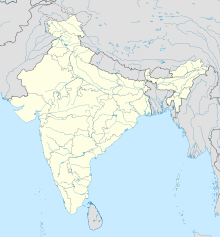The Ambala Air Force Station is an Air Force base situated north of the urban Ambala Cantt area in Haryana, India. The Ambala Air Force Station is the home to the first batch of advance multirole fighter jet Dassault Rafales that have been inducted to Indian Air Force.[2]
Ambala Air Force Station  | |||||||||||||||
|---|---|---|---|---|---|---|---|---|---|---|---|---|---|---|---|
| Summary | |||||||||||||||
| Airport type | Military | ||||||||||||||
| Owner | Indian Air Force | ||||||||||||||
| Operator | Western Air Command | ||||||||||||||
| Serves | Ambala Cantonment | ||||||||||||||
| Location | Ambala, Haryana | ||||||||||||||
| Occupants | No. 14 Squadron IAF No. 5 Squadron IAF No. 17 Squadron IAF | ||||||||||||||
| Time zone | IST (UTC+05:30) | ||||||||||||||
| Elevation AMSL | 275.2 m / 900 ft | ||||||||||||||
| Coordinates | 30°22′15″N 76°49′04″E / 30.37083°N 76.81778°E | ||||||||||||||
| Map | |||||||||||||||
 | |||||||||||||||
| Runways | |||||||||||||||
| |||||||||||||||
Location
editAmbala Air Force Station is considered one of the most strategically located bases of the IAF. The Indo-Pak border is around 220 km from there.[citation needed]
History
editIn 1919, first airstrip was built in Haryana when RAF Ambala was created, after the First World War Ambala Air Force Station was established following the independence of India.
Royal Air Force/Royal Flying Corps units include: No. 3 Squadron RAF, No. 5 Squadron RAF, No. 20 Squadron RAF, No. 28 Squadron RAF, No. 31 Squadron RAF, No. 60 Squadron RAF, No. 99 Squadron RAF, No. 114 Squadron RAF, No. 659 Squadron RAF[3]
In 1919, a Flying Instruction School (FIS) was formed here.
In 1947, FIS Ambala was moved to Tambaram near Chennai in Tamil Nadu, at Tambaram Air Force Station.
In both the 1965 and 1971 wars, Ambala Air Force Base was attacked by the Pakistani Air Force. In 1965, the Pakistanis struck Ambala and reportedly destroyed some 25 Indian planes just after they had returned from missions (the PAF did not initially claim any IAF aircraft during the attack on Ambala due to non-availability of damage in night bombing).[4] Indian Air Force rejected the Pakistani claim and stated that no aircraft were lost in Ambala during the war.[5]
It is also the home to the SEPECAT Jaguar of No. 5 Squadron IAF and No. 14 Squadron IAF, and aging MiG-21bis of No. 21 Squadron IAF.
In January 2019, it was announced to set up a civil enclave and extend runway of all five existing government airports in Haryana to at least 5,000 feet for midsize aircraft and business jets, and night landing and parking hangars will be constructed as airlines have approached the Haryana government to park their spillover "Non-scheduled Air Operations" (NSOP) aircraft from the congested IGI airport at Delhi to Bhiwani and Narnaul airport. Some of this development work at Hisar, Bhiwani and Narnaul airports is already underway.[6] Hisar will be extended to 10,000 ft by March 2022 for large air crafts.
On Feb 26, 2019, for India's 2019 Balakot airstrike in Pakistan, Mirage fighters took off from the Ambala air base, and the whole operation took 30 minutes.[7]
During 2020-21 covid pandemic, MChS Rossii flew to Ambala with relief supplies from Russia.
Assets
editIn 2018–19, Ambala Airforce station housed a squadron of SEPECAT Jaguar. in May 2020, the IAF became the house of the first batch of 36 latest Dassault Rafale fighter jets at Ambala Air Force Station and Hasimara Air Force Station.[8]
See also
edit- List of airports in India by state
- Military
- Other
References
edit- ^ a b World Airport Codes.
- ^ "Five Rafale jets leave for India: What happens next".
- ^ Jefford 1988, p. 153.
- ^ "Ambala Airbase". www.globalsecurity.org. Retrieved 14 September 2020.
- ^ "Indian Air Force Accidents and Incidents". Bharat-rakshak.com. Retrieved 19 March 2022.
- ^ All five airports in state to be developed expanded, The Tribune 8 January 2019.
- ^ "'Wait For Our Response,' Says Pak Army After India's Air Strikes". The Quint. Retrieved 26 February 2019.
- ^ "News18 Newsletter | All We Know So Far About India's Surgical Strike 2.0 on Pakistan". News18. Retrieved 26 February 2019.
- Bibliography
- Jefford, C. G. (1988). RAF Squadrons. A comprehensive record of the movement and equipment of all RAF squadrons and their antecedents since 1912. Shrewsbury: Airlife. ISBN 1-85310-053-6.

